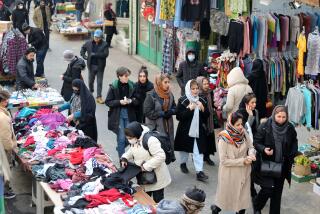Latin America : Brazil Economy Sputters Under Reform
RIO DE JANEIRO — Forceful anti-inflation action by President Fernando Collor de Mello has sharply reduced the Brazilian money supply, curtailing financial and commercial activity.
After taking office last week, Collor froze 80% of all the money deposits in bank accounts and financial funds--an estimated $85 billion. The freeze amounted to a moratorium on most of the government’s $70-billion domestic debt, because the debt was being turned over on the “overnight” financial market at interest rates that reached 83% a month.
On Monday the “overnight” rate dropped to 18% a month.
Many Brazilian analysts said they expect the money shortage to cause a recession. Jose Augusto Savazini, an economist with the University of Sao Paulo, predicted a drop of 6% to 7% this year in industrial production.
Collor, in a television interview Sunday night, said the government could avoid recession by releasing blocked deposits into the economy as needed to stimulate commercial activity.
“There is not going to be a recession,” he said, emphasizing that the tough measures were necessary to stop inflation that was racing at more than 70% a month.
Stock markets in Rio and Sao Paulo were paralyzed Monday and barely stirred Tuesday, and commerce went into a deep slump.
The newspaper O Estado de Sao Paulo said supermarket sales Monday in Brazil’s largest city were 30% to 40% below normal levels. Silvio Cunha, president of the Store Directors Club in Rio, said retail sales there have dropped by 90%.
“Without sales, we’ll have to lay people off,” Cunha said.
Government officials, however, said if widespread layoffs begin, authorities will take countermeasures such as increasing the period of advance notice required to dismiss employees.
“The president, the minister of economy and the minister of labor have insisted to businessmen that they not practice dismissals,” Labor Minister Antonio Rogelio Magri said. “The government has mechanisms to prevent this from happening.”
The freeze on deposits applies to amounts of more than about $1,200 in savings and checking accounts. It also blocks 80% of individual investments in financial funds or investments of more than $600, whichever amount is higher.
The “provisional measure” says the government’s central bank will retain the frozen deposits for 18 months, paying real interest of 6% a year and returning them in 12 monthly installments. Officials said deposits could be returned early if the anti-inflation plan is successful.
Companies with money in financial funds will be permitted to draw up to $12,000 of it to pay salaries and, if that is not enough, to use blocked deposits as collateral for loans, officials said. Many middle-income Brazilians are upset over the freeze on deposits. Some commentators called it a confiscation. But Collor said the freeze will affect only about 10% of the population.
To distinguish between frozen funds and circulating money, the government changed the name of Brazil’s currency from novo cruzado back to cruzeiro, the name it had until 1986. The cruzeiro has the same value as the novo cruzado.
The new president also froze prices temporarily. In mid-April, authorities will calculate a pre-set indexer that will set legal price increases for the following 30 days.
Federal police and other government agents monitored stores Tuesday throughout Brazil, enforcing an official price list. Another measure provides for fines and up to five years in jail for “economic abuses,” including overpricing.
The provisional measures must be approved by the Congress to stay in effect for more than a month.
TOURISM DROPS: Pollution and crime are keeping visitors away from Rio de Janeiro. D6
More to Read
Sign up for Essential California
The most important California stories and recommendations in your inbox every morning.
You may occasionally receive promotional content from the Los Angeles Times.










